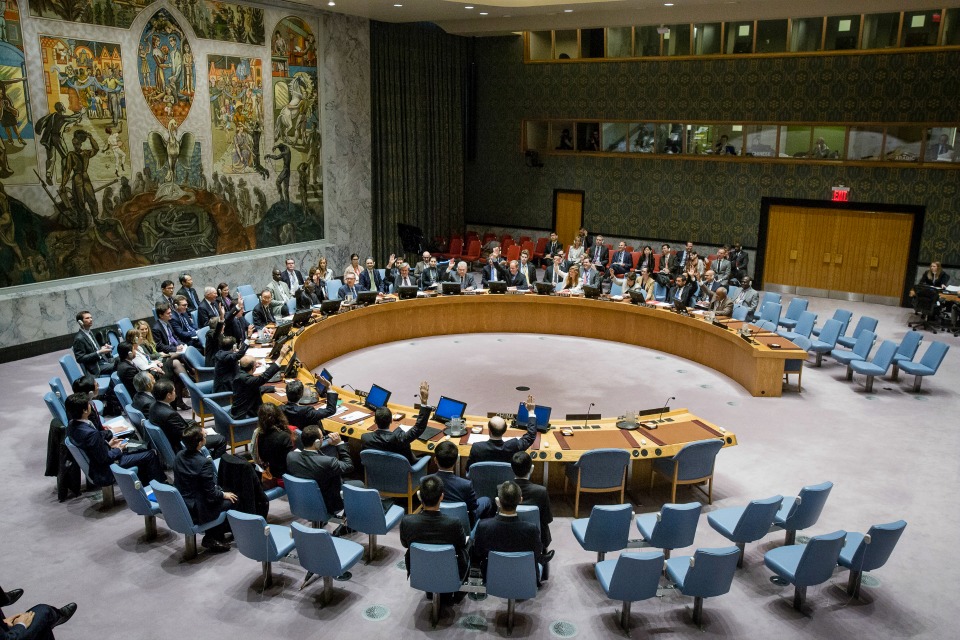We have sent a clear signal to the DPRK: the Security Council steadfastly opposes the reckless pursuit of nuclear weapons
Statement by Ambassador Matthew Rycroft, UK Permanent Representative to the United Nations, on UN Security Council resolution on the Democratic People’s Republic of Korea (DPRK).

Thank you Mr President.
The United Kingdom strongly supports the unanimous adoption of this Resolution. And we welcome the leading role played by the United States and China, and the statement this morning by the Secretary-General. In 2016, the Democratic People’s Republic of Korea has conducted an unprecedented number of provocations, including 2 nuclear tests. Today, we have shown that the international community will simply not stand for this.
We have sent a clear signal to the DPRK: the Security Council steadfastly opposes the reckless pursuit of nuclear weapons.
Today, we redouble our efforts to bring the DPRK back into the fold of law-abiding states. Until we see genuine commitment and actual steps to change course, UN sanctions will remain.
We must continue, with renewed vigour, to limit the activity of the DPRK entities involved in the nuclear programme; and to deter the involvement of any external actors tempted to facilitate such activity; and to constrain the DPRK’s ability to raise illicit funds.
We’re acting under Chapter 7 for the second time this year with regard to North Korea. That is far from standard practice, but this unique threat deserves nothing less.
Resolution 2270, in March, marked a substantive increase of pressure on the DPRK. Since then ships have been impounded, cargo has been intercepted, bank accounts have been closed.
If implemented fully by all Member States in the long-term, resolution 2270 can and will greatly reduce the ability of the DPRK to evade sanctions and raise funds.
But in the face of Council action, Pyongyang chose to continue on its course of confrontation. As a result, we have taken direct action to build on those landmark sanctions of resolution 2270. Three concrete steps in this new resolution illustrate our resolve.
First, the mechanism agreed to cap coal exports will directly target a sector used by the DPRK to raise foreign currency. Put simply, we have just denied nearly one quarter of the DPRK’s foreign income. That’s roughly 700 million dollars that from now on cannot be put forward towards the next nuclear test or the next missile launch.
This is a powerful message that will be heard loud and clear in Pyongyang: there are direct financial consequences to continued nuclear provocations.
Second, the resolution clarifies and further enhances controls agreed in 2270, including on technology imports, shipping, banking and the abuse by the DPRK of their privileges abroad. Every avenue for illicit activity must be shut down.
And finally, the text makes an explicit political statement condemning the DPRK’s proliferation choices at the expense of the welfare of their people. Every dollar spent on North Korea’s nuclear weapons programme is a dollar that could have been spent on improving the lives of its own citizens – roughly half of whom live in extreme poverty.
This resolution also breaks new ground calling for awareness of DPRK labourers being exploited abroad. Sadly, this is a textbook example of modern slavery, something that the DPRK employs both inside and beyond its borders.
When implemented fully, these further measures will create robust new constraints on the DPRK’s activity.
As with all Security Council action, this resolution is not intended to have adverse humanitarian consequences for the DPRK’s civilian population. And the resolution is not intended to affect negatively the work of international organisations or non-governmental organisations carrying out assistance and relief activities in the DPRK.
The United Kingdom has diplomatic relations with the DPRK, and will continue to work towards dialogue and a peaceful resolution of this crisis. Diplomacy must continue and be part of the solution.
We note that the resolution’s provisions, including the provisions on cargo, are consistent with the obligations set out in the Vienna Convention on Diplomatic Relations.
Finally Mr. President, the DPRK has a clear choice to make. Continue this destabilising and dangerous behaviour or follow clear steps and begin to rebuild a future for its people.
Today we are united in support for a meaningful change of course.